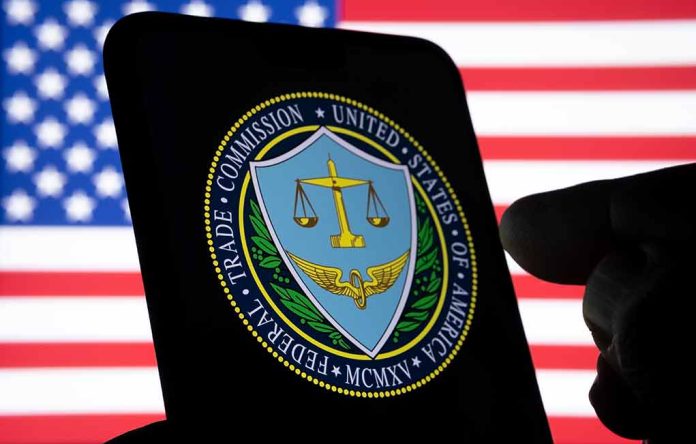
Federal Trade Commission commissioners rally for an inquiry into a suspected “censorship cartel” held by major Big Tech firms and advertising agencies.
At a Glance
- FTC Commissioner Andrew Ferguson calls for an investigation into alleged Big Tech censorship alliances.
- The inquiry aims to address concerns over monopolistic control impacting content freedom.
- Debate arises surrounding FTC Chair Lina Khan’s antitrust approach towards technology companies.
- House Republicans express skepticism over the FTC’s legal strategy and potential biases.
FTC Commissioners Urge Examination
FTC Commissioner Andrew Ferguson, along with Commissioner Melissa Holyoak, has urged for a comprehensive investigation into an alleged “censorship cartel” purportedly formed by Big Tech giants and their advertising counterparts. This coalition potentially holds undue sway over digital content and advertising spaces, suggesting actions that may undermine competitive fairness and freedom of speech. Ferguson’s initiative aims to spark Federal Trade Commission proceedings to possibly dismantle the cartel, reinstating balance in the digital sphere.
Concerns over monopolistic dominance by tech giants fuel the demand for this inquiry. Critics claim these companies affect marketplace equity and online discourse autonomy. Emphasis on examining these issues is reflected in Ferguson’s call for action, aligning with growing apprehensions around unchecked Big Tech influence.
Tensions Around FTC’s Legal Approaches
FTC Chair Lina Khan’s legal strategy in regulating major tech companies has faced criticism. Republicans have voiced concerns, accusing Khan of targeting tech firms inconsistently and questioning her legal maneuvers. They argue her tactics may adversely impact small businesses, while potential biases associated with these cases pose substantial worries.
In defense, Khan asserts that stringent regulations are crucial, emphasizing the risks posed by tech conglomerates to consumer welfare and economic prosperity. Her stance points to the overarching need for antitrust oversight due to the potential harm of unchecked corporate dominion. This stance is reinforced by her belief in rigorous antitrust enforcement for economic dynamism.
Broader Implications and Action Calls
Khan’s commitments have sparked national discourse on how best to combat Big Tech’s dominance. Efforts extend beyond congressional actions, with state legislative initiatives and civil society movements rallying to safeguard freedom of expression. They collectively advocate for revamping antitrust laws and scrutinizing new advertising technologies.
The conversation extends to discussions on Big Tech’s perceived suppression of conservative viewpoints, highlighting cases of censorship and information control. Such critiques underline the necessity for reformative actions in digital and regulatory landscapes.
Sources:
- House Republicans interrogate FTC’s Khan over regulation of Big Tech | AP News
- Combating Big Tech’s Totalitarianism: A Road Map | The Heritage Foundation
- FCC commissioner announces probe into Big Tech, ‘NewsGuard’ fact-checking platform: ‘Censorship cartel’ | Fox News













